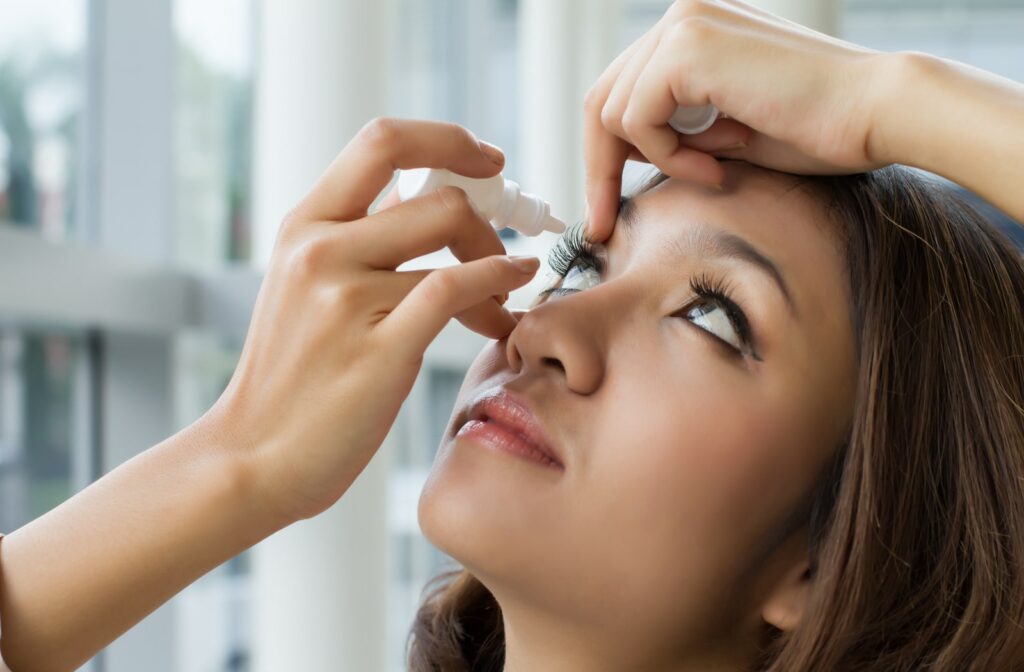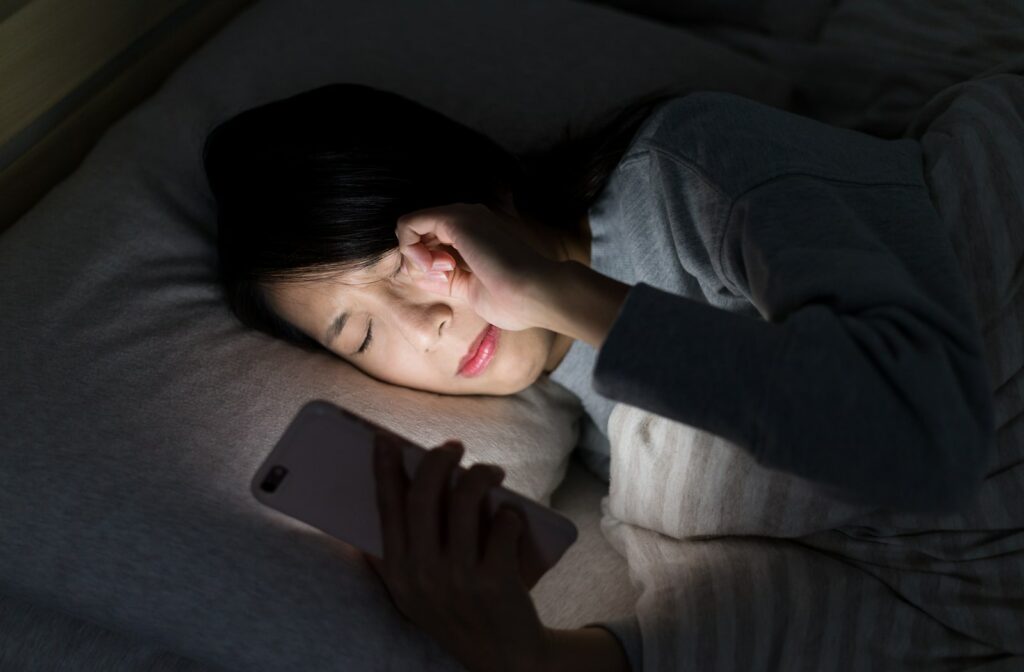Bedtime should be a time for relaxation and rest, not irritation and discomfort. But many people struggle with dry eyes at night.
In most cases, dry eyes are not an immediate cause for concern. Several things like climate, medication, or changes in your body can cause this condition. But there are also some underlying conditions that an optometrist can diagnose with a comprehensive eye exam.
Let’s take a look at some common causes of dry eyes and how you might be able to solve the problem without a visit to the eye doctor.
Causes of Dry Eyes at Night
One major cause of dry eyes is the lack of adequate tear production. There is no one-size-fits-all answer for why our eyes get dry, but here are several common causes:
- Age: As our bodies get older, sometimes our bodies don’t work as well. Many people over the age of 65 begin to experience issues like dry eyes.
- Blepharitis: A common cause of blepharitis is a blockage in the oil glands in your eyelids. And one significant symptom that accompanies this issue is dry eyes.
- Underlying health conditions: Several conditions such as rheumatoid arthritis or thyroid problems can cause dry eyes. Diabetes is another disease that can affect tear production.
- Hormonal changes: As the body changes during pregnancy and menopause, hormone imbalances can cause a lot of chaos in our bodies—dry eyes included.
- Medications: Unfortunately, dry eyes are a side effect of many over-the-counter (OTC) and prescription medications.
- Climate: Smoke in the air or dusty, arid climates can contribute to dry eyes—especially at night when you’re not blinking to lubricate your eyes continuously.
- Allergies: Dry eyes are a common symptom of many environmental allergies.
- Other sources: Excessive screen time or long periods of wearing contacts can contribute to dry eyes even after you’re not wearing them or using them.
Treating Dry Eyes
Luckily, there are many different treatment options for dry eyes—many of which are natural and don’t require an eye doctor’s prescription.
Medical Treatments
Some of these medical treatments are by prescription only, but many are available as OTC medicines.
- If medication is the cause of your dry eyes, discuss alternative medications with your doctor that don’t include dry eyes as a side effect.
- Depending on what an optometrist finds to be causing your dry eyes, there are several prescription medicines to increase tear production or decrease inflammation.
- There are several OTC eye drops that you can use to relieve dry eyes throughout the day.
- Sometimes using an OTC artificial tear gel or ointment overnight is beneficial. These tend to cause blurry vision, so they may not be ideal during the day.

Home Treatments
If you’d prefer the all-natural route, there are several things you can try to get relief from those dry eyes.
- Good hygiene is especially applicable if you’re struggling with blepharitis. Use baby shampoo or mild soap to clean your eyelids thoroughly.
- Holding a warm washcloth over your eyes helps soften any clogs or buildups you may have. This can help relieve dry eyes and stimulate tear production.
- Omega-3 fatty acids are great for eye health and can specifically help with dry eye symptoms. Your optometrist may even recommend an omega-3 supplement.
- Castor oil drops are known to help reduce the evaporation of tears.
Preventing Dry Eyes
It’s great that there are so many options for treating dry eyes, but wouldn’t it be great if we could prevent them in the first place? Unfortunately, there’s no guaranteed way to prevent them. But there are some steps we can take to reduce our chances of suffering from dry eyes.
- If you can’t reduce your screen time, ensure that you take adequate breaks. In addition to making sure you blink often, practice the 20-20-20 rule. Every 20 minutes, take 20 seconds to look 20 feet around.
- Keeping the air humid can help with dry eyes at night—especially if you live in an arid climate. A humidifier is a great investment for good eye health.
- Try and reduce the amount of time you spend wearing contacts. If you can’t do that, ensure you’re cleaning them properly.
- Reducing the amount of allergens in your bedding by changing it frequently can help prevent getting dry eyes at night due to allergies.
- Because dry eyes are caused by a lack of tears, ensuring that you’re well-hydrated is a great way to help your body do its job. Not to mention, good hydration is essential for many other of our body’s functions.
When to Visit an Optometrist
Although dry eyes aren’t typically a cause for immediate concern, no one enjoys the discomfort from dry eyes—especially if you’re waking up that way.
If you struggle with dry eyes at night after trying some home remedies and OTC eye drops, it would be good to schedule a visit with your optometrist. They can potentially diagnose the exact problem, then prescribe or recommend treatments to get you back to normal.
Closing Thoughts
Suffering the discomfort of dry eyes at night is never fun. If you’ve tried some of these home remedies and nothing is helping, it may be time to talk to your optometrist. Contact us at Griffin Optometric Group today, and we can discuss your options and get you scheduled with an optometrist.



